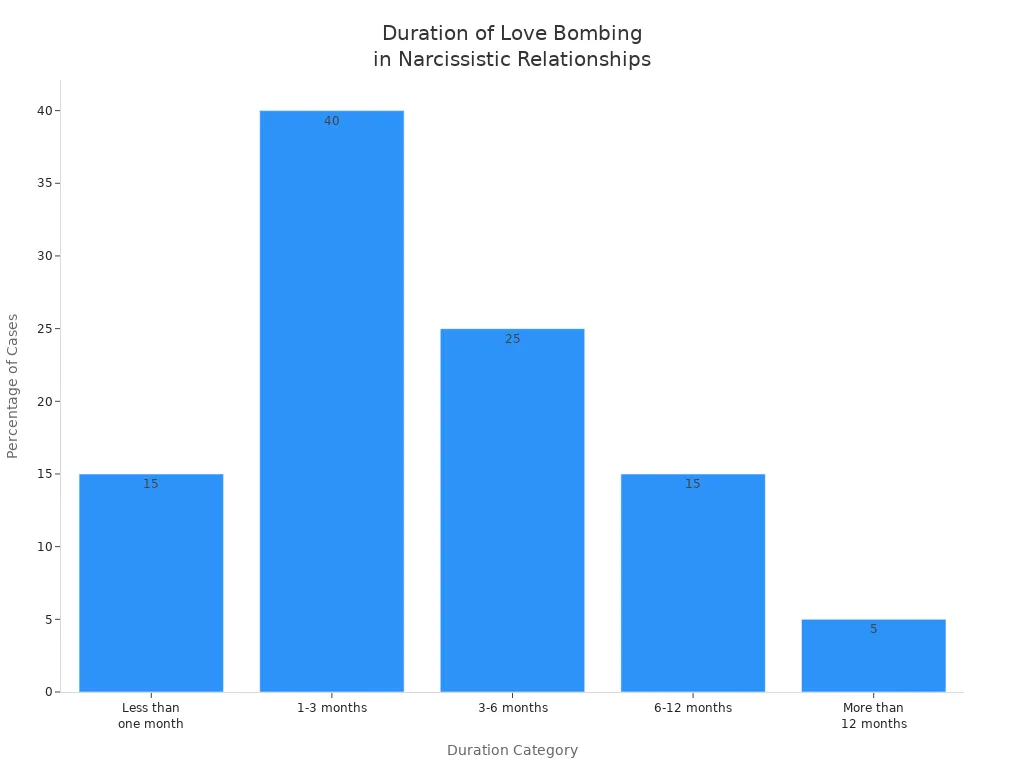Last updated on December 29th, 2025 at 06:40 am
If you’re wondering about the average length relationship narcissism tends to produce, you’re not alone. Recent studies and surveys reveal that the average length relationship narcissism is involved in typically lasts between three to six months.
Much of this data comes from individuals sharing their experiences and from online surveys. Understand how long do narcissistic relationships last.
TL;DR
Most relationships with narcissists last three to six months.
The ‘love bombing’ phase can last weeks or up to a year.
Narcissists have trouble keeping long relationships because they focus on themselves.
Watch for warning signs like constant criticism and no empathy to stay safe.
Money issues can make it harder to leave a narcissistic relationship.
Knowing the three stages of narcissistic relationships helps you spot unhealthy patterns.
Take a look at the table below, which highlights how long people usually experience the intense “love bombing” phase in relationships marked by narcissism:
Duration of Love Bombing | Percentage of Cases |
|---|---|
Less than one month | 15% |
1-3 months | 40% |
3-6 months | 25% |
6-12 months | 15% |
More than 12 months | 5% |

Average Length Relationship Narcissism
Research Findings
People ask, “How long do narcissistic relationships last?” Most of these relationships last three to six months. Some reports say they can last much longer.
One survey asked 1,000 people about their experiences. Some said their relationships lasted up to nine-and-a-half years. Other stories say the average is about six months.
Experts do not all agree on what “average length relationship narcissism” means. Some use survey results. Others use their own experiences or what they see in their work.
Here is a table that clears up some common mistakes about average length relationship narcissism:
Misconception | Correction |
|---|---|
Most relationships with narcissists last only a few weeks | Many last 3-6 months, but some can stretch to several years |
All relationships with narcissists end quickly | Some last up to 9.5 years, especially when certain factors are present |
There is a single, clear answer for average length relationship narcissism | Definitions vary depending on the source and method used |
Survey Data
It is easy to get confused about average length relationship narcissism. Researchers have not done many long studies on this topic. Most information comes from surveys and personal stories. These sources show that relationships can last for different amounts of time.
Some surveys say the average is six months.
A few rare cases last up to nine-and-a-half years.
The meaning of average length relationship narcissism depends on where the data comes from.
Here is a table that shows why research is limited:
Evidence Type | Description |
|---|---|
Lack of Longitudinal Data | Researchers have not followed couples for a long time, so it is hard to know when problems start. |
Retrospective Data Limitations | Most studies ask people to remember what happened, which can be wrong. |
Dyadic Approach Deficiency | Few studies look at both partners, so we do not see everything. |
Experts say more research is needed. They want studies that follow couples over time and look at how people’s views change.
Why Relationships Are Short
You might wonder why these relationships do not last long. The answer is in how narcissists act.
Narcissists have trouble loving others because they do not love themselves.
They see their partners as people who give them attention.
They do not care about others’ feelings, which causes problems.
At first, narcissists seem nice, but soon their selfishness shows.
Some relationships last longer, but only if certain things happen:
Narcissists stay if they get lots of praise and attention.
Some stay because they are afraid to be alone.
They may want to look successful or stable.
Money can also keep them in a relationship.
Most relationships with narcissists end fast. The excitement goes away and problems get worse. The average length relationship narcissism is shorter than most other relationships.
Factors Affecting Length
Narcissism Type
Overt vs. Covert
Narcissists act in different ways. Some show off and want attention. Others hide their true selves. Overt narcissists brag and want everyone to notice them. Covert narcissists seem shy but still want control. They also want people to admire them.
Type | Common Behaviors | Impact on Relationship Duration | Example Scenario |
|---|---|---|---|
Overt Narcissist | Boasting, dominating, criticizing | Shorter, more dramatic breakups | You feel drained after constant fights |
Covert Narcissist | Playing victim, silent treatment | Can last longer due to confusion | You feel guilty and try to fix things |
Recent studies show covert narcissists keep you guessing. You might stay longer because you hope things will get better. Overt narcissists make their plans clear. This can make the relationship end faster.
Disorder vs. Traits
Not everyone with narcissistic traits has Narcissistic Personality Disorder. Some people have a few traits but can care about others. People with NPD find it hard to make healthy bonds.
Characteristic | Narcissistic Traits | Narcissistic Personality Disorder (NPD) |
|---|---|---|
Relationship Dynamics | Can engage in open communication | Often leads to manipulation and poor reciprocity |
Emotional Impact | Frustrating but manageable | Emotionally draining and damaging |
Relationship Duration | Can maintain longer relationships | Typically results in shorter relationships |
Grandiose narcissism makes relationships less happy.
People with NPD may get angry or defensive.
NPD often causes one-sided and short relationships.
Partner Awareness
Recognizing Red Flags
You can spot warning signs early. Watch for constant criticism or no empathy. If you see these, you may leave sooner. This makes the relationship shorter.
Setting Boundaries
Setting boundaries helps you stay safe. If you say “no” or ask for respect, the narcissist may push back. If you stand firm, the relationship may end faster. You keep your self-worth.
External Influences
Support Systems
Narcissists often keep their partners away from friends and family. This makes the partner depend on the narcissist for support. It is harder for the partner to leave.
Financial Ties
Money can make you stay longer. Shared bills, homes, or kids make leaving hard. If you have financial freedom, you can make choices for yourself.
Relationship Stages
Relationships with narcissists usually follow a set pattern. There are three main stages: Idealization, Devaluation, and Discard. Each stage has its own signs and actions. Knowing these stages helps you see unhealthy patterns and keep yourself safe.
Idealization
In the idealization stage, the narcissist tries hard to impress you. You feel important and cared for. This stage can last weeks or even a year, depending on the relationship.
Love Bombing
You get lots of attention and praise. The narcissist gives you gifts and compliments. This “love bombing” makes you feel very happy and wanted.
You hear praise all the time.
The narcissist wants to be with you always.
You think you have found your dream partner.
Tip: If someone moves too fast or seems perfect, stop and check for warning signs.
Fast Commitment
The narcissist often wants things to move quickly. You might feel pushed to make big choices early, like living together or planning the future.
Fast Commitment Signs | What You Might Notice |
|---|---|
Quick declarations | “I love you” very soon |
Sudden plans | Talks about marriage or kids |
Pressure to commit | Wants you to promise things |
Devaluation
After the fun part ends, the narcissist starts acting differently. You notice more mean comments and less kindness. This stage can last weeks or months.
Manipulation
The narcissist tries to control you. You may feel mixed up or guilty. They twist your words and make you doubt yourself.
Lots of criticism and mean words
Less love and attention
No respect for your limits
Avoids you and keeps you alone
Criticism
You hear more negative things about yourself. The narcissist points out your mistakes and makes you feel bad. Your confidence drops.
Impact on You | |
|---|---|
Criticism | You feel less sure of yourself |
Manipulation | You question what is real |
Withholding | You feel lonely and left out |
Discard
The discard stage happens when the narcissist thinks you are not useful anymore. This stage often comes fast and can hurt a lot.
Sudden End
The narcissist may break up without warning. You feel surprised and confused. Sometimes, they stop caring before leaving.
Note: Narcissists often look for new people to give them attention after they leave a partner.
Aftermath
After the discard, you may feel sad and unsure of yourself. The narcissist might try to talk to you again to get control back. This is called “hoovering.”
Discard Stage | What Happens |
|---|---|
Sudden breakup | Relationship ends very quickly |
Narcissist acts cold and distant | |
Hoovering | Tries to reconnect with you |
Why Relationships End

Breakup Triggers
You might wonder why these relationships end. Many breakups happen because the same problems keep coming back. Narcissists act in ways that make staying together very hard.
They often play with your feelings and use your weak spots.
Sometimes, they try to make you feel bad so you will not leave.
They may try to make you jealous just to see your reaction.
When they think you might leave, they promise big changes.
You might hear things like, “I’ll hurt myself if you go,” or “No one gets me like you do.”
They may even use sad things from your life against you, saying, “You want to leave while I’m still sad about my mom?”
These actions can make you feel stuck. After a while, you may see the relationship is not good for you. You might choose to leave when you see these things happen again and again. Many people end things when they feel worse about themselves or when the pain is too much.
Tip: If you see these signs, listen to your feelings. You should be treated with care and respect in every relationship.
Emotional Impact
Breaking up with a narcissist can feel harder than other breakups. You may face special problems that hurt your mind and body.
The narcissist may act mean or tell lies about you after you leave. They might try to turn people against you.
You may feel more hurt because you trusted this person a lot.
The narcissist often does not care about your pain, which can make you feel alone.
You might notice deep sadness that does not go away. Many people feel nervous or very sad after leaving a narcissist. Your self-worth may feel very low. Some people have trouble thinking clearly or feel different than before. Stress that lasts a long time can even make your body feel sick.
You may feel cut off from friends and family.
Getting better can take a long time and sometimes needs help from a counselor.
Bad memories can make it hard to trust people again.
Note: You can heal. Help from friends, family, or a therapist can help you feel better and stronger.
Warning Signs

It is important to spot warning signs early. This helps you stay safe in a relationship with a narcissist. You might see changes in how your partner acts. You may also notice changes in how you feel. These signs often show up before the relationship ends.
Narcissist Behavior
Detachment
Narcissists often pull away when they get bored. You may feel like your partner is not there for you. They might stop asking about your day. They may ignore your feelings. You could see them spending less time with you. They might act cold or distant. This can make you feel lonely and confused.
Here are some behaviors that show a relationship might end soon:
Love Bombing: At first, you get lots of attention. Later, this stops quickly.
Lack of Genuine Interest in Your Needs: Your partner ignores your feelings or problems.
Excessive Need for Admiration: They want praise all the time. They get upset if you do not give it.
Controlling Behavior: You may feel you have no choice in decisions.
Lack of Compromise: Your needs do not matter. Your partner will not meet you halfway.
If you see these changes, trust your feelings. You should be treated with respect and care.
Seeking New Supply
When a narcissist feels bored, they look for new people. You might see your partner flirting with others. They may spend more time online. They could talk about new friends. They might hide their phone or act secretive. This search for “new supply” can make you feel left out.
Partner Red Flags
Isolation
Narcissists often try to keep you away from friends and family. You may spend less time with people you care about. Your partner might say things like, “They do not understand us,” or “You only need me.” This makes it hard for you to get help or advice.
Study/Source | Findings |
|---|---|
Journal of Personality and Social Psychology (Foster et al., 2003) | Narcissistic traits linked to lower relationship satisfaction and higher divorce rates. |
National Institute on Relationship Dynamics (2019) | Nearly 1 in 4 divorced individuals reported covert narcissism as a significant factor in their breakup. |
Journal of Personality Disorders (2015) | Narcissistic injury leads to escalated conflict, with covert narcissists intensifying manipulative behaviors. |
Feeling alone is a big warning sign. Try to stay in touch with people who care about you.
Escalating Conflict
Arguments may happen more often and get worse. Small problems can turn into big fights. Your partner may blame you for everything. They might twist your words. Over time, these fights can make you feel bad about yourself.
You may feel like you cannot do anything right.
You might notice more yelling or silent treatment.
Stress from these fights can hurt your health.
Conclusion
Most relationships with narcissists last about three to six months. Some can last longer if certain things happen. You can keep yourself safe by noticing patterns early.
Look for a constant need for praise. Watch for a lack of caring about your feelings. Notice if they try to control or trick you.
Frequently Asked Questions
How long do narcissistic relationships usually last?
Most relationships with narcissists last 3 to 6 months. Some can last longer, even years, if you have strong ties or do not see the warning signs early.
Can a narcissistic relationship ever become healthy?
You cannot change a narcissist’s core behavior. Healthy relationships need respect and empathy. Narcissists often lack these traits, so the relationship rarely becomes healthy.
What makes it hard to leave a narcissist?
You may feel confused by mixed signals. Love bombing, guilt, or fear can keep you stuck. Shared finances or children also make leaving harder.
Are there signs a narcissist will end the relationship soon?
Yes. You might notice detachment, more criticism, or secretive behavior. Narcissists often seek new attention when they lose interest in you.
Do narcissists miss their ex-partners?
Narcissists usually miss the attention, not the person. They may try to reconnect if they need more praise or control.
Is it common to feel isolated in these relationships?
Yes. Narcissists often try to cut you off from friends and family. This isolation makes you depend on them more and feel alone.
